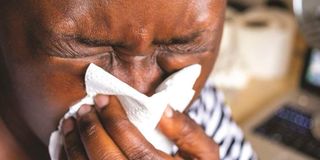Flu outbreak? Kenyans complain of widespread bug

Research shows that cold weather worsens upper respiratory tract infections in humans; therefore, Kenyans should brace themselves for high flu cases during this cold season.
Innumerable Kenyans have complained of flu-like symptoms, including running nose, fever, sneezing, and headaches for the last few weeks.
Dr Ahmed Kalebi, an independent consultant pathologist, noted that the increased flu cases in the country are caused by human influenza type A virus –a contagious viral infection that attacks the respiratory system.
“It’s flu season, and based on the information that I’ve received from lab colleagues testing swab samples for Covid-19 where the PCR test also detects influenza type A & B plus RSV, the unfolding increase in flu cases is caused by human influenza type A virus, while Covid-19 remains low,” Dr Kalebi said.
Dr Kalebi played a central role in Covid-19 testing at the lab where he was the ceo.
He further noted that during the two years of the Covid-19 pandemic, flu cases in the country went down because of masking and other public health measures announced to prevent the surge in Covid-19 cases.
“Those experiencing flu symptoms should avoid spreading the infections to others. The ones able to test whether they have Covid-19 can use a self-test kit or go to a lab for testing,” he said.
However, according to Dr Samwel Symekher, a Kenya Medical Research Institute (Kemri) researcher, their surveillance shows there is no outbreak.
Fflu spreading across the country
“The samples that we have been working on show low coronavirus but we have not yet detected any influenza virus cases in the country,” Dr Symekher said.
He added that the flu spreading across the country is attributed to the rainy season.
Dr Symekher urged Kenyans to adopt preventive measures such as wearing masks, keeping warm, eating healthy, and exercising higher standards of personal hygiene, including handwashing and visiting local health providers for treatment if need be.
“We know from our long-term studies in Kenya that influenza viruses circulate all year, so you can expect a certain number of people to have the flu at any given time. Previous studies have shown that Kenya records two peaks following rainy seasons,” he added.
For his part, Dr Kalebi asked Kenyans to take protective measures.
“Whatever the cause of the ongoing spike in viral respiratory illnesses, and irrespective of whether it’s due to a surge in Flu A with or without rising Covid-19, the protective measures remain the same for all,” he advised.
Research shows that cold weather worsens upper respiratory tract infections in humans; therefore, Kenyans should brace themselves for high flu cases during this cold season.
Influenza (flu) can cause mild to severe illness and can lead to death. Flu is different from a cold; flu usually attacks suddenly.
Most people who get flu will recover in a few days to less than two weeks, but some people will develop complications (such as pneumonia) due to flu, some of which can be life-threatening and result in death.





